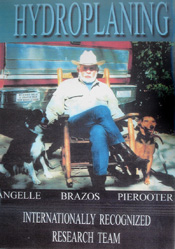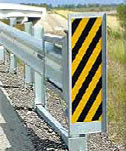My Writings
Professional Interests
Barriers (Roads)
- Guardrails
- Bridgerails
- Construction Barriers
Crash Cushions and Guardrail terminals
Education
Ph.D., Structural Engineering and Structural Mechanics, The A&M College of Texas.
M.Eng., Structural Engineering, The A&M College of Texas
Experience
Professor Emeritus, Civil Engineering, Texas A&M University, 1995 - Present.
Research Engineer, Safety and Structural Systems Division, Texas Transportation Institute, May 1994 - August 2007.
Professor, Civil Engineering, Texas A&M University, September 1971 - September 1995.
Associate Agency Director, Texas Transportation Institute, November 1998 - April 1994.
Professional Registration
Registered Professional Engineer in Texas, Registration No. 25617.
Affiliations
Member, American Society for Testing and Materials, Committee E-17, Skid Resistance.
Member, Phi Kappa Phi National Honor Society.
Member, American Society of Civil Engineers (ASCE).
Member, Transportation Research Board (TRB), Committee A2A04, Roadside Design.
Member, Second International Skid Prevention Conference, Steering Committee.
Representative, Permanent International Association of Navigation Congresses (PIANC), Technical Committee on Slipperiness and Eveness.
Chairman, State Department of Highways and Public Transportation / Texas Transportation Institute, Committee on Standards and Guidelines for Cost Effective Safety Improvements.
Member, Institute of Transportation Engineers (ITE).
Member, Chi Epsilon - The National Civil Engineering Honor Society.
Member, National Cooperative Highway Research Program (NCHRP), Committee 1-14, Highway Geometrics.
Member, Transportation Research Board (TRB), Subcommittee A3B112, Accident Reconstruction, 1985.
Chairman, Transportation Research Board (TRB), Task Force for State-of-the-Art, 1982.
Chairman, Transportation Research Board (TRB), Committee A2B07, Vehicle Surface Interaction, 1976 - 1982.
Latest Works
Don L. Ivey, through Texas Transportation Institute and Texas A & M University, has authored over 100 publications and peer reviewed reports during his 40 year career in highways safety research. These reports encompass the subjects of handling and stability of automobiles and tractor semi-trailers, tire pavement friction, hydroplaning, collision dynamics, roadside safety and safety structures (guardrails, bridge rails, break away structures and crash cushions).

His most recent contributions include leading the task groups for Transportation Research Board (TRB) that have authored State of the Art Report (SOAR) No. 9 "Utilities and Roadside Safety" and a complete revision of SOAR No. 1 "The Influence of Roadway Surface Discontinuities on Safety". The revision will be SOAR No. 16.
This reports includes chapters titled:
- Accident Data Relationships
- Roughness, Holes and Bumps: Positive Effects of Roadside Strips
- Pavement Edges
- Friction Variations
- Water Accumulations
- Surface Containments and Small and Large Vehicles
Patents
AD-IV Breakaway System for Timber Utility Poles, Patent No. 4986687, January 1991.
Low Profile Concrete Road Barrier, Patent No. 5156485, October 1992.
Safety End Barrier for Concrete Road Barriers, Patent No. 5295757, March 1994.
Pedestrian Safety Barrier, Patent No. 5302047, April 1994.
Gandy Dancer: End Piece for Crash Cushion of Rail End Treatment, Patent No. 5348416, September 1994.
Metal Beam Rail Terminal, Patent No. 5391016, February 1995.
Frame Catcher Adaptation for Guardrail Extruder Terminal, Patent No. 6089782, July 2000.
Pipe Rack Crash Cushion, Patent No. 6179516.
Patents Pending
Small Car Side Hit Adaptation for ET-2000, applied on October 1996.
Barrel Crash Cushion 3500, applied on March 1997.
Honors/Awards
ASCE Invited Lecturer, American Society of Civil Engineers (ASCE), 1988.
Outstanding Paper Award, Transportation Research Board (TRB), 1988.
The Kummer Lecture Award, American Society for Testing and Materials, 1979.
1st Recepient, Honorary Forum, Dialogue with Leaders in Design and Construction of Transportation Facilities, January 10, 2005
Recent Topics
| By Transportation Research Board , National Research Council (U.S .), Committee on Utilities |
| Published 2004 Transportation Research Board |
| ISBN 0309094518 |
Chat with ME Live
Scientific Inquiry Inc.
1421 Fawn Lake Dr.
Bryan, TX 77808
337-824-1494
Fax: 337-824-5986
Email: donivey@bellsouth.net
Research

The ET-2000™ is a federally approved, competitively priced, energy-absorbing end treatment. It can be used at the termination of flexible barriers on the shoulder of a roadway or in the median. The ET-2000™ is a cable-anchored system utilizing standard guardrail components.
